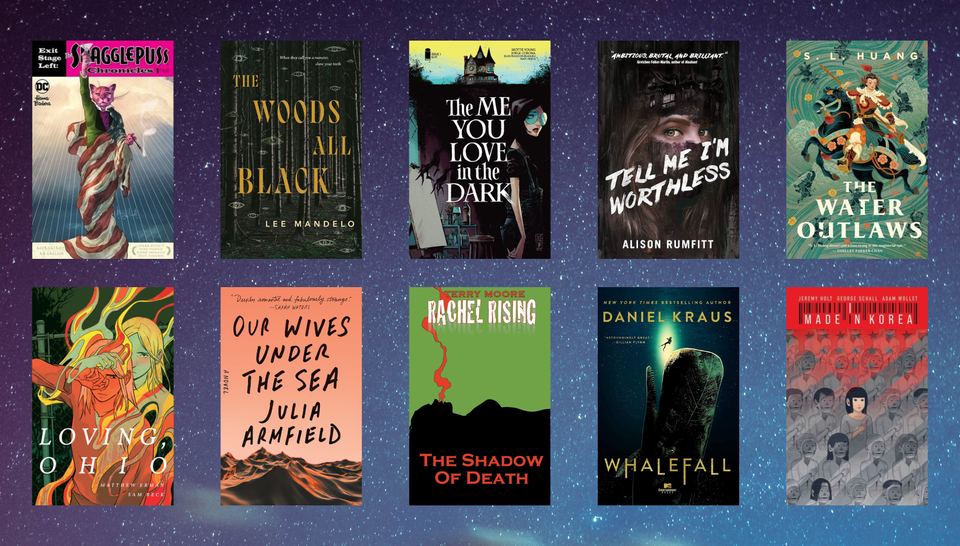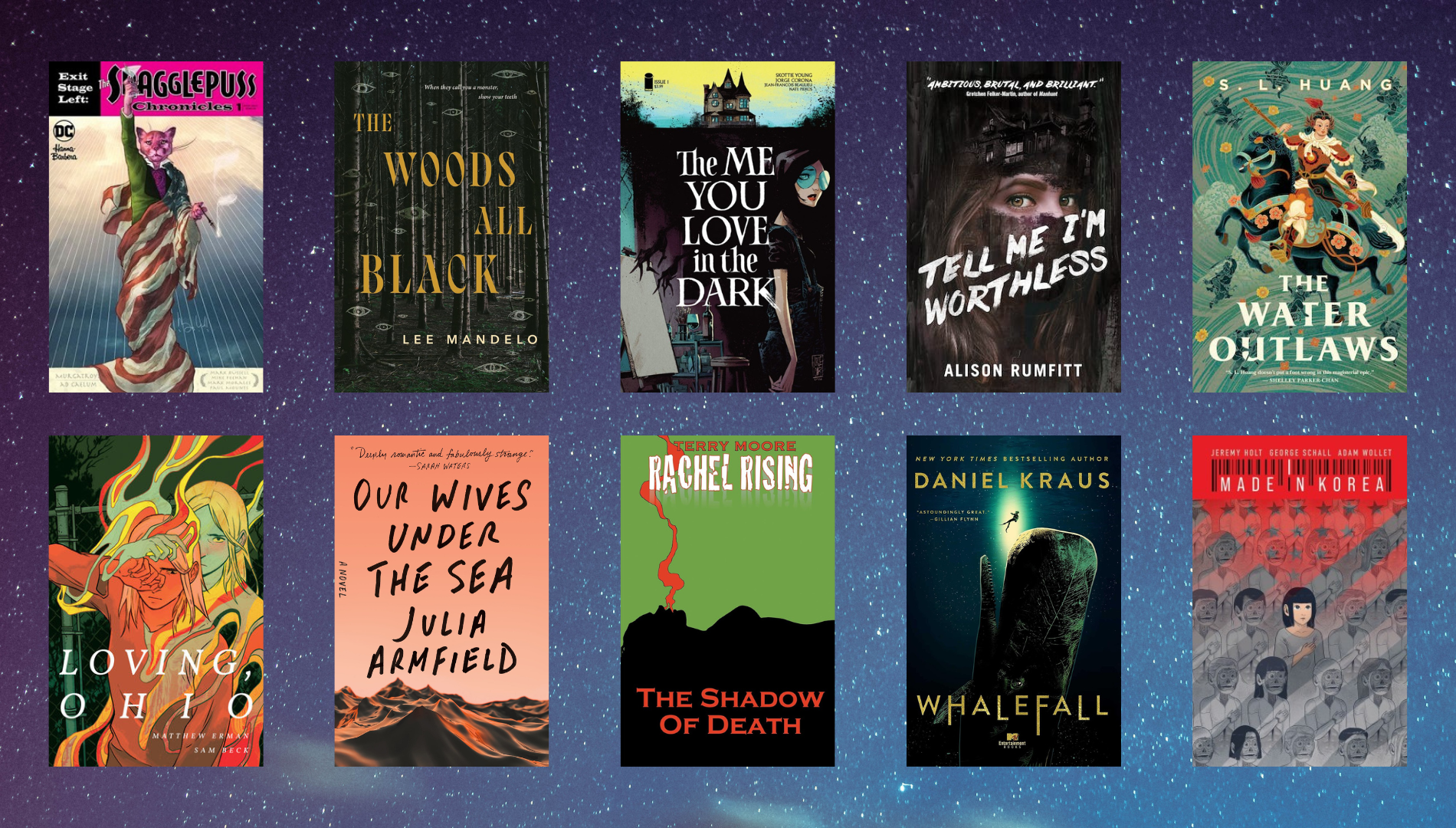My Favorite Reads of 2023 Wrap Up

In 2023, I lost much of my ability and desire to read prose. Looking back, I can see a few reasons, which really just add up to “it was a tough year.” I spent this year slowly working my way toward a very difficult health diagnosis; I spent this year rewriting the same novel twice (going on three times); I spent this year holding a struggling relationship together. 2023 has been a time, for me, of Going Through It, and it was difficult to find a reading rhythm through it all.
Since I was struggling so much to read, I occasionally sought out books that seemed like they’d be easy on the brain, kind of like eating buttered toast on a sick stomach. I found that many of the novels I dipped into wound up veering into strangely retrograde themes of gender essentialism, individualist anticonsumerism, and a hyper-affected queasiness around sex and sexuality that brought back memories of late-nineties and early-aughts network television. This is far from a representation of the state of literature as a whole! Even so, I was dismayed to encounter so many bland reiterations of long-established neoliberal and latently anti-queer sentiments in so many books that seemed to promise to contain at least a few nutrients—like discovering that my buttered toast was actually just a large, flat packing peanut. I kept flipping to the jacket copy and asking myself: Does this author know they’re parroting TERF talking points, or are they just repeating things they’ve never thought to question? I’ve certainly been in the latter seat many times and have a great deal of sympathy for those who are still figuring out what to accept—and yet I also find myself growing weary of having to question whether I’m encountering nascent morality or simple monstrosity. The result of this was that when I read a book that truly did have something to say, I found myself completely absorbed.
When I wasn’t able to connect with prose at all, I filled my creative well almost entirely with comics and graphic novels. I had an unending appetite for comics this year, and approached them just as hungrily as I approached meaningful prose. In this medium I found a lot more of what I was looking for—moral and ethical challenge, interest in the plasticity of the form, and fascinating questions about the nature of humanity and creativity and relationships. Part of my good fortune in my comics-reading was that I had the full power of trusted recommendations behind my reading list; friends and colleagues in the comics industry steered me well, helping me build a curriculum of study that included many of the masters of the form. I wound up pulling new titles as well as long-established ones, reading year-by-year across genres.
I read 423 books this year, counting graphic novels, trades, and the occasional single-issue comic in addition to the fewer-than-usual novels I finished. Most months—I was less consistent this year, see paragraph one for details—I shared my favorite reads with Stone Soup readers. There’s a full list of all those favorites at the bottom of this post, but first, here are the ten books that stuck with me most from my year of reading (including some that I didn’t get around to sending you when I first encountered them!):

- Exit Stage Left: The Snagglepuss Chronicles by Mark Russell and Mike Feehan
- I cannot stop recommending this book. I want to buy one hundred copies of it and thrust it under the nose of every new person I meet. This reimagination of Snagglepuss as a closeted gay playwright navigating creativity in the McCarthy era is sublime, heartbreaking, and terribly, terribly relevant.
- The Woods All Black by Lee Mandelo
- Mandelo is quickly becoming an automatic schedule-ruiner for me. When a Mandelo title shows up on my doorstep or in my inbox, I have no choice but to cancel plans. This one is no exception—a rich, humid, blazingly confrontational book that does not pull a single punch.
- The Me You Love in the Dark by Skottie Young and Jorge Corona
- I have simply never seen a stronger representation on the page of both the creative process and the feeling of entering and choosing to stay in an abusive relationship. There is something about a bad relationship—abusive or otherwise—that soaks up and ultimately smothers creativity while seeming to fuel it; this gorgeous, sneaky, devastating book understands that like no other.
- Tell Me I'm Worthless by Alison Rumfitt
- Rumfitt’s prose is relentless. This book offers insights without tidy answers; it has teeth on its teeth and presents the reader with no cuteness or naivete. It is raw and seething, and it will not love you back, but it will flense you until your soul feels as open as an oyster.
- The Water Outlaws by SL Huang
- I had no idea how much I needed this book until I read it. SL Huang delivers cinematic action and champion-level worldbuilding within a story of magic, court drama, and flawed justice. This book is fun as hell to read, but still delivers deeply contemplative reflections on the nature of violence within an intricate universe.
- Loving, Ohio by Matthew Erman and Sam Beck
- This book is outrageously good. It combines the horror of a high-control community with the hope of leaving home and the bizarre normalcy of growing up. This once brings a nuanced understanding of the reasons people fall into cult dynamics to a truly terrifying story. It’s measured, direct, and profoundly insightful.
- Our Wives Under the Sea by Julia Armfield
- What a truthful telling of grief this book contains. Armfield has created a stunning narrative out of the full, terrible complexity of grieving a person who is lost but not yet gone. This book is heartbreaking, heart-healing, and completely unlike anything I’ve ever read before or since.
- Rachel Rising by Terry Moore
- Rachel Rising is one of the best things I have ever read, full stop. It appears effortless in the way an olympic gymnast’s introductory movements appear effortless; Moore’s fundamentals are so excellent that they become invisible, and all the reader gets is a brilliantly executed story. This series is tender, gruesome, and ultimately hilarious.
- Whalefall by Daniel Kraus
- Of course I loved Whalefall. How could I not? It examines grief (a theme for me this year, apparently) through a violent and consuming lens. The process of actually facing such a massive and terrible emotion is one that digests and destroys us; Kraus places that experience in the literal belly of a whale, in a fabulous non-metaphor that immerses the reader in an externalized and transformative suffering. Deeply-researched and frankly simply fascinating, this book is truly unique in the landscape.
- Made In Korea by Jeremy Holt, George Scnall, and Adam Wollet
- This book changed my understanding of what stories can be. It presents a narrative that remains absolutely consistent and true to itself, while also seeming to shift several times in its focus. One realizes, over and over, that the story has been saying many things at once all along; that those things are fundamentally connected at the root. Intelligent in all its emotional depth, I found this book to be as damning as it is refreshing.
Here are all the books I shared in my Favorite Reads series this year:

- Iris Kelly Doesn’t Date by Ashley Herring Blake
- Beware the Woman by Megan Abbott
- Vampironica by Greg Smallwood and Meg Smallwood
- Strange Adventures by Tom King
- The Wrong Earth by Tom Peyer, Paul Constant, Jamal Igle, Juan Castro, Frank Cammuso, Gary Erksine, and Tom Feister
- A Map to The Sun by Sloane Leong
- Coming Back by Jessi Zabarsky
- Where Monsters Lie by Kyle Starks and Piotr Kowalski

- The Red Mother by Jeremy Haun and Danny Luckert
- The Silver Coin edited by Chris Hampton
- Ms. Marvel by G. Willow Wilson, Adrian Alphona, and lan Herring
- Sins of the Black Flamingo by Andrew Wheeler, Travis Moore, and Tamra Bonvillain
- Boys Weekend by Mattie Lubchansky
- Resonant by David Andry, Alejandro Aragon, Jason Wordie, and Deron Bennett
- The Backstagers by James Tynion IV, Rian Sygh, and Walter Baiamonte
- A Haunting on the Hill by Elizabeth Hand

- The Gigantic Beard That Was Evil by Stephen Collins
- Child Star by Brian "Box" Brown
- Die by Kieron Gillen & Stephanie Hans
- Kroma by Lorenzo De Felici
- Last to Leave the Room by Caitlin Starling
- Raw Dog by Jamie Loftus
- The Mermaid, the Witch, and the Sea by Maggie Tokuda-Hall
- Revival by Tim Seeley and Mike Norton

- Into the Light by Mark Oshiro
- White Cat, Black Dog: Stories by Kelly Link
- A House With Good Bones by T. Kingfisher
- Feed Them Silence by Lee Mandelo
- Monstrilio: A Novel by Gerardo Sámano Córdova
- Hawkeye Vol. 1: My Life as a Weapon by Matt Fraction, Javier Pulido, and David Aja
- She-Hulk by Dan Slott, Ty Templeton, Scott Kolins, Paul Pelletier, Will Conrad, and Juan Bobillo
- Black Cat by Jed MacKay, Nao Fuji, Travel Foreman, and Pepe Larraz

- Castle Waiting by Linda Medley
- The Human Target by Tom King and Greg Smallwood
- Something Is Killing the Children by James Tynion
- The Nice House on the Lake by James Tynion
- The Closet by James Tynion
- Gyo by Junji Ito
- Uzumaki by Junji Ito
- Maw by Jude Ellison S. Doyle, A.L. Kaplan, and Fabiana Mascolo

- The Many Deaths of Laila Starr by Ram V and Filipe Andrade
- Crowded by Christopher Sebela, Ro Stein, Ted Brand, Triona Farrell. and Cardinal Rae
- Bubble by Jordan Morris, Sarah Morgan, Tony Cliff, and Natalie Riess
- That Texas Blood by Chris Condon and Jacob Phillips
- Now Is Not the Time to Panic by Kevin Wilson
- Delilah Green Doesn't Care by Ashley Herring Blake
- Camp Damascus by Chuck Tingle
- Chlorine by Jade Song
If you’re not already a member of the Stone Soup Supper Club, now is a great time to join! The Supper Club keeps the lights on here at Stone Soup, allowing me to pay a fair rate to those who contribute to essay series as well as the intrepid team that makes sure everything happens on time and correctly in your inbox.
Here's a link for 10% off a Supper Club membership. There’s never been a better time to sign up. I can't wait to see you there!
—Gailey






Member discussion